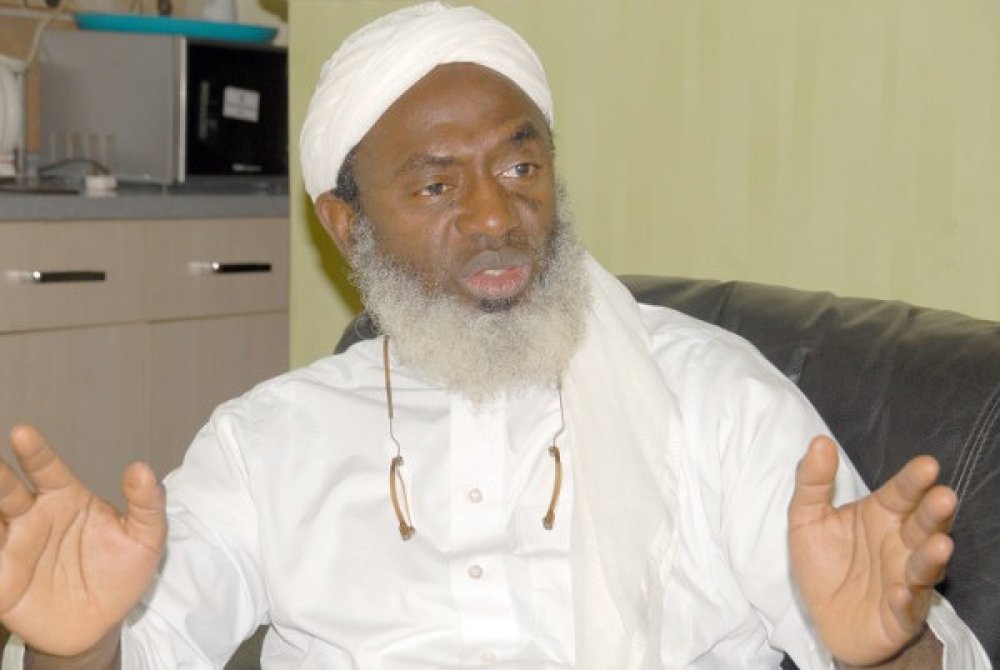Saudi Arabian authorities have deported Sheikh Ahmad Gumi, a renowned Nigerian Islamic scholar, and barred him from participating in this year’s Hajj pilgrimage. The decision, which has raised eyebrows across the Muslim world, was confirmed by Gumi himself in a detailed statement shared on his official Facebook page earlier today. The deportation has ignited debates about religious freedom, international diplomacy, and the intersection of politics and pilgrimage, with many seeking clarity on the reasons behind Saudi Arabia’s move.
Sheikh Ahmad Gumi, a prominent figure in Nigeria’s Islamic community, is widely respected for his scholarly contributions, including his deep knowledge of Islamic jurisprudence and his vocal stance on socio-political issues. As a former military officer turned cleric, Gumi has built a reputation as a fearless commentator, often addressing sensitive topics such as governance, security, and global politics. His outspoken views, particularly on matters concerning Nigeria’s security challenges and international relations, have made him a polarizing yet influential figure. This year, Gumi was selected as part of a delegation of Nigerian scholars sponsored by the National Hajj Commission of Nigeria (NAHCON) to provide religious guidance and support to Nigerian pilgrims during the 2025 Hajj in Mecca and Medina.
According to Gumi’s statement, he had been granted a valid visa by the Saudi authorities and traveled to Medina with high hopes of fulfilling his spiritual and professional duties. However, upon arrival at Prince Mohammad bin Abdulaziz International Airport in Medina, he was detained by Saudi officials and informed that he was not permitted to enter the Kingdom. The scholar was promptly deported, an action he attributes to his “views on world politics.” While Gumi did not elaborate on the specific views that led to his exclusion, his statement has prompted speculation about whether his critiques of certain geopolitical issues or his advocacy for dialogue with controversial groups in Nigeria may have played a role.
“It is with a heavy heart that I inform my followers and the Muslim Ummah that I have been denied entry into the Kingdom of Saudi Arabia to perform this year’s Hajj,” Gumi wrote in his Facebook post. “Despite having a valid visa and being part of an official delegation, I was told my presence was not welcome due to my perspectives on global political matters. This is a test from Allah, and I accept it with humility, but I urge all to reflect on the implications of such actions on the unity of the Muslim world.”
The decision to bar Gumi has sent ripples through Nigeria’s Muslim community, which numbers over 100 million and constitutes one of the largest Muslim populations in the world. The Hajj, one of the five pillars of Islam, is a deeply significant spiritual journey that draws millions of Muslims to Mecca annually. For many, the opportunity to perform Hajj is a lifelong aspiration, and being denied entry is not only a personal setback but also a matter of public concern. Gumi’s deportation has raised questions about the criteria used by Saudi authorities to regulate entry for the pilgrimage and whether political differences are increasingly influencing access to this sacred rite.
The National Hajj Commission of Nigeria (NAHCON), which oversees the country’s participation in the Hajj, has responded swiftly to the incident. In a statement released today, NAHCON expressed its surprise and disappointment at Gumi’s deportation, emphasizing that the scholar was part of an officially sanctioned delegation. “Sheikh Ahmad Gumi was selected for his expertise and commitment to guiding Nigerian pilgrims,” the statement read. “We are engaging with Saudi authorities through diplomatic channels to seek clarification and ensure that such incidents do not recur.” NAHCON’s response underscores the delicate balance between religious obligations and international relations, as Nigeria seeks to maintain strong ties with Saudi Arabia, a key ally and the custodian of Islam’s holiest sites.
This incident is not the first time Saudi Arabia has restricted entry to prominent figures during the Hajj season. The Kingdom has occasionally barred individuals deemed to pose a security risk or whose public statements are seen as conflicting with its policies. In recent years, Saudi Arabia has tightened its oversight of the Hajj, citing the need to manage the massive influx of pilgrims and ensure the safety and sanctity of the pilgrimage. However, Gumi’s case stands out due to his prominence and the lack of transparency regarding the specific reasons for his exclusion. Some analysts suggest that his past calls for dialogue with insurgent groups in Nigeria, as well as his critiques of certain global powers, may have drawn the ire of Saudi officials, though no official confirmation has been provided.
The deportation has also sparked a broader conversation about the intersection of religion and politics. For many Muslims, the Hajj is a unifying event that transcends national and ideological boundaries, symbolizing the equality of all believers before God. The exclusion of a scholar like Gumi, who has dedicated decades to Islamic education and community leadership, has led some to question whether political considerations are undermining this spirit of unity. Social media platforms, particularly X, have been abuzz with reactions, with some users defending Saudi Arabia’s right to regulate its borders and others criticizing the move as an overreach that stifles free expression.
In Nigeria, where Gumi commands a significant following, the incident has fueled calls for greater transparency and accountability. Religious leaders and civil society groups have urged the Nigerian government to press Saudi Arabia for an explanation, arguing that the deportation sets a troubling precedent for future pilgrims. “Sheikh Gumi is not just an individual; he represents the aspirations of millions of Nigerian Muslims,” said Mallam Ibrahim Yusuf, a community leader in Kaduna. “If a respected scholar can be turned away without clear justification, what does this mean for ordinary pilgrims?”
As the 2025 Hajj season approaches, with millions preparing to converge on Mecca, Gumi’s deportation serves as a reminder of the complex dynamics at play in the global Muslim community. The incident highlights the challenges of balancing religious obligations with political realities, as well as the delicate relationship between Saudi Arabia and the diverse nations that send pilgrims to its shores. For now, Gumi has vowed to continue his work from Nigeria, expressing hope that dialogue between Nigerian and Saudi authorities will resolve the matter. “This is not the end,” he wrote. “The pursuit of knowledge and truth continues, with or without access to the Holy Land.”
The Nigerian government has yet to issue an official statement, but sources indicate that the Ministry of Foreign Affairs is working closely with NAHCON to address the issue diplomatically. As the story unfolds, the eyes of the Muslim world will be on both nations, watching how this incident shapes the future of the Hajj and the broader relationship between Nigeria and Saudi Arabia.
Join our Whatsapp channel to stay updated always!


